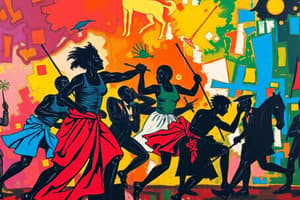Podcast
Questions and Answers
What was Gabriel's Rebellion?
What was Gabriel's Rebellion?
- A plot to end slavery
- A violent revolution led by slaves
- A message sent to Virginia's white residents
- All of the above (correct)
What years did the Haitian Revolt take place?
What years did the Haitian Revolt take place?
1791-1804
Who was Henry Moss?
Who was Henry Moss?
A slave in Virginia who marketed himself as a curiosity and bought his freedom.
Thomas Jefferson believed black people were incapable of mental improvement.
Thomas Jefferson believed black people were incapable of mental improvement.
What did Republican Motherhood emphasize?
What did Republican Motherhood emphasize?
What was the Louisiana Purchase?
What was the Louisiana Purchase?
What foreign policy did Jefferson implement with the Embargo Act of 1807?
What foreign policy did Jefferson implement with the Embargo Act of 1807?
What did James Callender accuse Jefferson of?
What did James Callender accuse Jefferson of?
What was Tecumseh known for?
What was Tecumseh known for?
What happened at the Battle of Fallen Timbers?
What happened at the Battle of Fallen Timbers?
Match the following terms with their definitions:
Match the following terms with their definitions:
Who wrote the national anthem, 'The Star Spangled Banner'?
Who wrote the national anthem, 'The Star Spangled Banner'?
What treaty ended the War of 1812?
What treaty ended the War of 1812?
Flashcards are hidden until you start studying
Study Notes
Gabriel's Rebellion
- A significant plot by slave Gabriel to end slavery in Virginia.
- Gabriel sent threats to white residents, asserting that slaves could organize a violent revolution.
Haitian Revolt
- Occurred between 1791 and 1804, marking a pivotal slave uprising in Haiti.
Henry Moss
- A Virginia slave who marketed himself in Philadelphia as "a great curiosity."
- Earned money for his freedom, becoming an infamous figure due to skin changes that made him appear white by 1795.
Notes on the State of Virginia
- Written by Thomas Jefferson in 1784, asserting that Black people could not improve mentally and potentially had separate ancestry.
- Provoked backlash from antislavery advocates, notably Benjamin Banneker, who challenged Jefferson's views on racial equality.
Thomas Jefferson
- Defeated John Adams in a presidential election.
- Authored "Notes on the State of Virginia," promoting polygenesis, which suggested inferior racial traits in Blacks.
- Advocated for reduced taxes and government budget cuts to stimulate economic growth.
Republican Motherhood
- Early American ideology emphasizing women's roles in instilling liberty and virtue in their children.
- Women's actions gained political significance as femininity intertwined with revolutionary values.
Louisiana Purchase
- Jefferson oversaw the acquisition of Louisiana from France in 1803, a landmark real estate transaction for the U.S.
USS Chesapeake
- A U.S. naval ship attacked by the British in 1807, inciting calls for war among Americans despite a preference for peace among leadership.
- Captain James Lawrence's USS Chesapeake was defeated by HMS Shannon in 1813.
Embargo Act of 1807
- A foreign policy enacted by Jefferson, closing U.S. ports to foreign trade to avoid war.
- Resulted in economic hardship and backlash from Federalist critics.
Sally Hemmings
- Notable figure as one of Jefferson's enslaved women, involved in controversial discussions regarding Jefferson's personal life.
James Callender
- Journalist who accused Jefferson of a sexual relationship with Sally Hemmings, suggesting it undermined Jefferson's racial integrity.
Tecumseh
- Shawnee leader who sought to unite Native American tribes against American encroachment.
Tenskwatawa
- Tecumseh's brother and a prominent prophet advocating for Native unity against colonial influence.
Neolin
- A Delaware prophet who inspired resistance against British colonialism, urging a return to Native traditions and rejection of European ways.
Battle of Fallen Timbers
- Marked the defeat of the "Western Confederacy" in 1794, influencing later Native American resistance efforts.
Red Stick Creeks
- A faction led by Hillis Hadjo, who allied with Tecumseh to oppose European influence.
- Faced a civil war against other Creek factions, ultimately losing significant territory after their defeat at the Treaty of Fort Jackson.
Andrew Jackson
- Key military figure who led forces against the Red Sticks, achieving notable victories including at the Battle of Horseshoe Bend.
Battle of Tippecanoe
- A failed effort at pan-Indian unity led by Tecumseh, resulting in military action against Native Americans in the Ohio Valley.
James Madison
- Responded to pressure from War Hawks, drafting a declaration of war against Britain in 1812, marking the start of the War of 1812.
War of 1812
- Conflict between the U.S. and Great Britain, reinforcing American national identity amidst economic and territorial disputes.
Impressment
- The British practice of forcing American sailors into their navy, a key grievance leading to the War of 1812.
War Hawks
- A group, including Henry Clay and John C. Calhoun, eager for war with Britain, seeking to assert U.S. rights and independence.
James Lawrence
- Captain of the USS Chesapeake, known for his rallying cry, "Don't give up the ship!” during battle against the British.
Plattsburgh
- Site of decisive American naval victories in 1814 on Lake Champlain, thwarting British invasion plans.
Ft. McHenry
- Defended against a British naval assault, inspiring Francis Scott Key to write "The Star-Spangled Banner."
Battle of New Orleans
- Andrew Jackson led American forces to victory against British troops in January 1815, enhancing morale and national pride.
Treaty of Ghent
- Signed on December 24, 1814, effectively ending the War of 1812 and restoring U.S.-British relations to previous conditions.
Hartford Convention
- A gathering that raised suspicions of secession among delegates, amidst growing dissatisfaction with the War of 1812.
John C. Calhoun
- A War Hawk instrumental in advocating for the War of 1812, shaping future American political dynamics.
Monroe Doctrine
- Proclaimed in 1823, asserting U.S. opposition to European colonialism in the Americas, reflecting postwar national confidence.
Studying That Suits You
Use AI to generate personalized quizzes and flashcards to suit your learning preferences.




